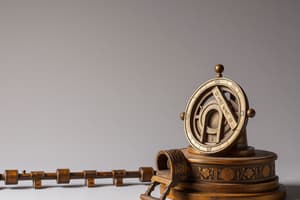Podcast
Questions and Answers
Which scientist is known as the father of observational astronomy and modern physics?
Which scientist is known as the father of observational astronomy and modern physics?
- Johannes Kepler
- Nicolaus Copernicus
- Isaac Newton
- Galileo Galilei (correct)
What did Johannes Kepler develop?
What did Johannes Kepler develop?
- Three laws of planetary motion (correct)
- Theory of relativity
- Laws of Thermodynamics
- Theory of evolution
Who is considered the father of modern chemistry?
Who is considered the father of modern chemistry?
- Antoine Van Leeuwenhoek
- Otto von Guericke
- Charles Darwin
- Robert Boyle (correct)
Which contribution is attributed to Isaac Newton?
Which contribution is attributed to Isaac Newton?
What did Zacharias Janssen invent?
What did Zacharias Janssen invent?
Flashcards are hidden until you start studying
Study Notes
Scientific Revolution and Key Figures
- Epoch spanning from the 16th to 18th century in Europe, marking a transition to empirical observation from internal power reliance.
- Leonardo Da Vinci: Italian polymath, known for innovations like the horizontal water wheel.
- Nicolaus Copernicus: Polish astronomer who proposed the heliocentric model, challenging Aristotelian and Ptolemaic systems. Key features: uniform heavenly motion, Earth's three motions, and retrograde motion.
- Tycho Brahe: Danish astronomer whose observations were crucial for formulating laws of planetary motion.
- Galileo Galilei: Italian scientist regarded as the father of observational astronomy, modern physics, and the scientific method. Notable works include studies on speed, velocity, free fall, and inertia; invented the water thermometer and hydrostatic balance.
- Johannes Kepler: German mathematician known for his three laws of planetary motion and contributions to improving the refracting telescope. Key laws include planetary orbits around the sun, variable planet speeds, and calculable orbital paths.
- William Harvey: English physician who discovered systemic circulation and the function of blood flow from the heart.
- Zacharias Janssen: Dutch lens maker credited with inventing the first compound microscope.
- Otto von Guericke: German physicist who explored vacuums and electrostatic repulsion, known for creating the first air pump.
- Robert Boyle: Anglo-Irish chemist recognized as the father of modern chemistry, known for Boyle's Law relating to the pressure of gases.
- Antoine Van Leeuwenhoek: Dutch scientist celebrated as the father of microbiology for his discovery of single-celled organisms, termed "animalcules," and for innovations in microscopy.
- Isaac Newton: English mathematician and physicist known for developing calculus, the three laws of motion, law of gravitation, binomial theorem, and theories regarding colors.
- Charles Darwin: English naturalist renowned for his theory of evolution, laying the groundwork for Darwinism.
- Sigmund Freud: Austrian neurologist who established psychoanalysis, focusing on the unconscious mind's influence on behavior.
- Id: Represents primal urges and desires.
- Ego: Mediator that operates within the realm of reality and conscious decision-making.
- Superego: Acts as the moral compass and critical conscience.
- Introduced concepts such as psychic energy, the Oedipus complex, and dream analysis for treating psychological conditions.
Purpose of Studying Science
- Deddens' Five Reasons:
- Inspire curiosity in scientific inquiry.
- Understand historical and continuous progress in science.
- Integrate diverse scientific ideas and concepts.
- Seek the truth through systematic investigation.
- Emulate positive attitudes and approaches within scientific exploration.
Studying That Suits You
Use AI to generate personalized quizzes and flashcards to suit your learning preferences.




